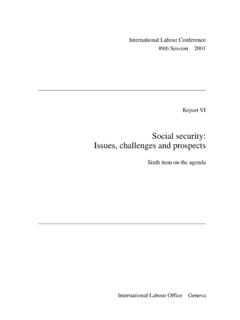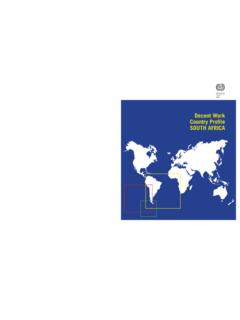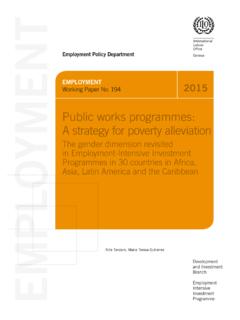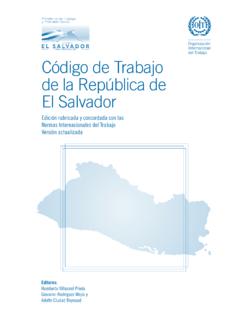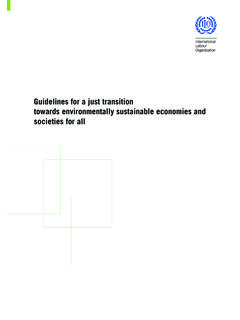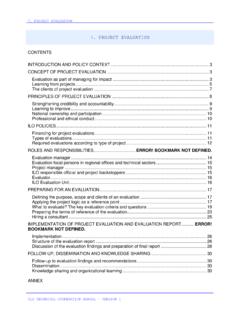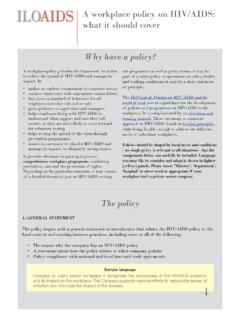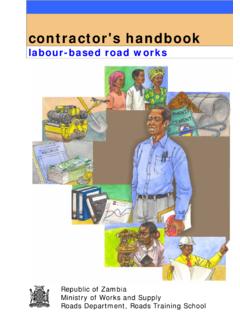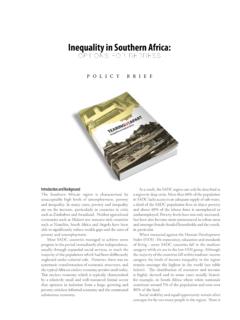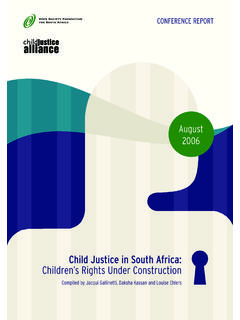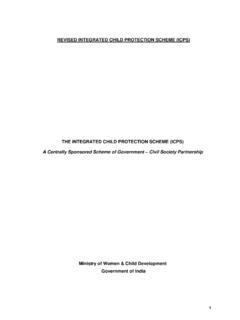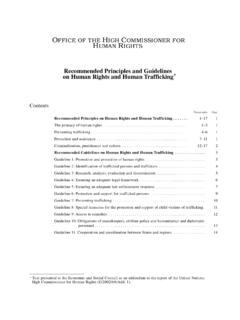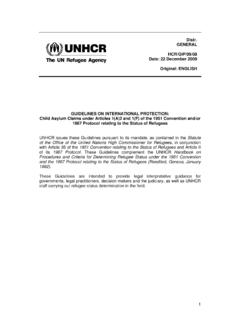Transcription of The Labour Principles - International Labour Organization
1 The Labour Principles of the United Nations Global Compact A Guide for Business The Labour Principles of the United Nations Global Compact A Guide for Business elimination of all forms of forced and compulsory Labour The Labour Principles of the United Nations Global Compact A Guide for Business elimination of all forms of forced and compulsory Labour Copyright International Labour Organization 2008. First published 2008. Reprinted 2010. Publications of the International Labour Office enjoy copyright under Protocol 2 of the Univer- sal Copyright Convention. Nevertheless, short excerpts from them may be reproduced without authorization, on condition that the source is indicated. For rights of reproduction or translation, application should be made to ILO Publications (Rights and Permissions), International Labour Office, CH-1211 Geneva 22, Switzerland, or by email: The International Labour Office welcomes such applications. Libraries, institutions and other users registered with reproduction rights organizations may make copies in accordance with the licences issued to them for this purpose.
2 Visit to find the reproduction rights Organization in your country. The Labour Principles of the United Nations Global Compact : A Guide for Business / International Labour Office. - Geneva: ILO, 2008. ca. 30 p. ISBN: 978-92-2-121823-4 (print); 978-92-2-121824-1 (web pdf);. workers' rights / equal employment opportunity / discrimination / forced Labour / child Labour / ILO. Declaration / corporate responsibility / enterprise Also available in Spanish: Principios laborales del Pacto Mundial de las Naciones Unidas. Gu a para empresas (ISBN: 978-92-2-321823-2 (print), 978-92-2-321824-9 (web pdf), Geneva 2010). ILO Cataloguing in Publication Data The designations employed in ILO publications, which are in conformity with United Nations practice, and the presentation of material therein do not imply the expression of any opinion whatsoever on the part of the International Labour Office concerning the legal status of any country, area or territory or of its authorities, or concerning the delimitation of its frontiers.
3 The responsibility for opinions expressed in signed articles, studies and other contributions rests solely with their authors, and publication does not constitute an endorsement by the International Labour Office of the opinions expressed in them. Reference to names of firms and commercial products and processes does not imply their endorse- ment by the International Labour Office, and any failure to mention a particular firm, commercial product or process is not a sign of disapproval. ILO publications and electronic products can be obtained through major booksellers or ILO local offices in many countries, or direct from ILO Publications, International Labour Office, CH-1211. Geneva 22, Switzerland. Catalogues or lists of new publications are available free of charge from the above address, or by email: Visit our website: Designed and photocomposed in Switzerland BIP. Printed in France NOU. Table of Contents Preface 1. Foreword 3. Ten Principles of the United Nations Global Compact 6.
4 Introduction 7. The Labour Principles 9. Where the UN Global Compact Labour Principles come from: The ILO Declaration on Fundamental Principles and Rights at Work 9. The broader set of Labour Principles companies should be aware of 11. The relationship between Labour Principles and business 11. Understanding and applying the Labour Principles 13. Uphold freedom of association and the effective recognition of the right to collective bargaining (UN Global Compact Principle 3) 15. What does freedom of association mean ? 15. What does collective bargaining mean ? 15. What is the responsibility of government ? 17. Why are freedom of association and effective recognition of the right to collective bargaining important ? 18. How can companies uphold freedom of association and the effective recognition of the right to collective bargaining ? 18. Uphold the elimination of all forms of forced and compulsory Labour (UN Global Compact Principle 4) 21. What does forced Labour mean ?
5 21. How can companies contribute to the elimination of forced Labour ? 22. Uphold the effective abolition of child Labour (UN Global Compact Principle 5) 27. What constitutes child Labour ? 27. Why should companies be concerned about child Labour ? 28. What can companies do to uphold the effective abolition of child Labour ? 29. Uphold the elimination of discrimination in respect of employment and occupation (UN Global Compact Principle 6) 31. What does discrimination in respect of employment and occupation mean ? 31. What can companies do to eliminate discrimination in respect of employment and occupation ? 33. Inventory of ILO Resources 35. Annex: Short Overview of the ILO Tripartite Declaration of Principles concerning Multinational Enterprises and Social Policy (ILO MNE Declaration) 47. List of Boxes 1. The Labour Principles of the United Nations Global Compact 8. 2. The United Nations Global Compact Labour Working Group 8. 3. Core Labour Conventions 10.
6 4. Identifying forced Labour in practice 23. 5. Minimum age for admission to employment or work 27. 6. ILO Helpdesk for Business 35. Preface The Labour Principles of the UN Global Compact may be among the most specific of the initiative's ten Principles , but that does not mean that they are the easiest to implement. Many companies face difficulties in knowing what is expected of them and what more can be done to uphold these Principles . There is thus much scope for learning, dialogue and collective action, including partnerships, as ways to complement other approaches ai- med at bringing about responsible Labour practices. This is the contribution that the UN Global Compact seeks to make. Today, the UN Global Com- pact is the largest corporate citizenship initiative with over 6,000 business participants and other stakeholders involved in more than 130 countries. Thankfully, some excellent guidance materials have now been developed to help businesses of all sizes and from all sectors and locations.
7 It is our hope that this Guide an output of the newly established Global Compact Labour Working Group will help raise further awareness of the existence of these materials and be a very useful Guide for business everywhere. Georg Kell Executive Director UN Global Compact Office elimination of all forms of forced and compulsory Labour 1 . Foreword The International Organisation of Employers (IOE) and the International Trade Union Confederation (ITUC) share the conviction that government has the fundamental obligation to ensure that the rights of its citizens, including workers and employers, are protected. They also agree that public action by the State is essential if the environment is to be respected and sustainable development is to be achieved. In the area of Labour standards, employers' and workers' organizations have participated in developing and adopting interna- tional Labour standards since the creation of the tripartite International Labour Organization (ILO) in 1919.
8 We understand that adopting standards or laws is not sufficient to ensure that they are respected. In the area of Labour standards, that requires efficient, hon- est, and effective Labour inspection and systems of justice. In fact, rule of law is vital to ensuring that citizens, employers, and workers and their trade unions have their rights fully respected in all of the areas covered by the 10 United Nations Global Compact Principles . The ITUC and the IOE see the United Nations Global Compact as one way to engage in dialogue that will help to achieve adequate governance so that elimination of all forms of forced and compulsory Labour public authority is credible, and so that government is fair and functions well for everybody. Only governments have the political legitimacy and responsibility to legislate and enforce. We seek to make governments more responsible rather than shifting those responsibilities to private parties. We recognize, however, that companies can play an important and positive role by taking on board some of the Principles contained in International Labour standards.
9 The Global Compact incorporates some of the most vital ones, including those that are considered to be human rights Principles . The ILO Declaration on Fundamental Principles and Rights at Work is the source of these Principles . 3 . This Guide includes a brief description of each of the four Global Compact Labour Principles : freedom of association and the effective recognition of the right to collective bargaining; the elimination of all forms of forced and compulsory Labour ; the effective abolition of child Labour ; and the elimination of discrimination in respect of employment and occupation. It also contains an inventory of key ILO materials concerning these Principles . There are a number of other Principles derived from International Labour standards, including those in the important areas of occupational health and safety, employment, and training. Several of these Principles are contained in the ILO Tripartite Declaration of Principles Concerning Multinational Enterprises and Social Policy.
10 The IOE and the ITUC join together in recom- mending the use of that declaration as a source of guidance. The ITUC and the IOE appreciate the valuable assistance, time, consulta- tion and, at times, patience, from the ILO in the preparation of this Guide. As can be expected from autonomous organizations representing the inter- ests of workers and employers, there is not automatic or easy agreement on every detail in this Guide and we would have, independently, worded certain things differently. We hope, nevertheless, that this Guide makes it easier for companies to understand the Principles and facilitates their respect. The ILO is developing experience working directly with companies. It has long supported employers' and workers' organizations to engage with companies. It welcomes the opportunity to make these materials available to companies, workers' and employers' organizations. We also commend these materials to the UN Global Compact Local Networks and any other organizations interested in strengthening their capacity to give effect to the UN Global Compact Labour Principles .
